Examining Fiscal Policy for Health Promotion in Thailand Report
VerifiedAdded on 2023/03/23
|7
|1611
|66
Report
AI Summary
This report examines Thailand's fiscal policies aimed at promoting health and preventing non-communicable diseases (NCDs) in the context of an aging population and increasing urbanization. It highlights the use of taxes on unhealthy products like sugary drinks, tobacco, and alcohol, as well as subsidies and other incentives for healthier choices. The report discusses the opportunities and challenges in implementing these policies, including political influences, globalization, and bureaucratic hurdles. It further explores policy alternatives and their implications, emphasizing the need for Thailand to assert its national interests in health policy and reduce reliance on external influences. The report concludes with recommendations for independent policy-making to effectively address the health needs of Thai citizens, advocating for a shift from neo-liberal ideals to prioritize the well-being of the population over foreign economic interests. Desklib provides access to similar reports and study tools for students.
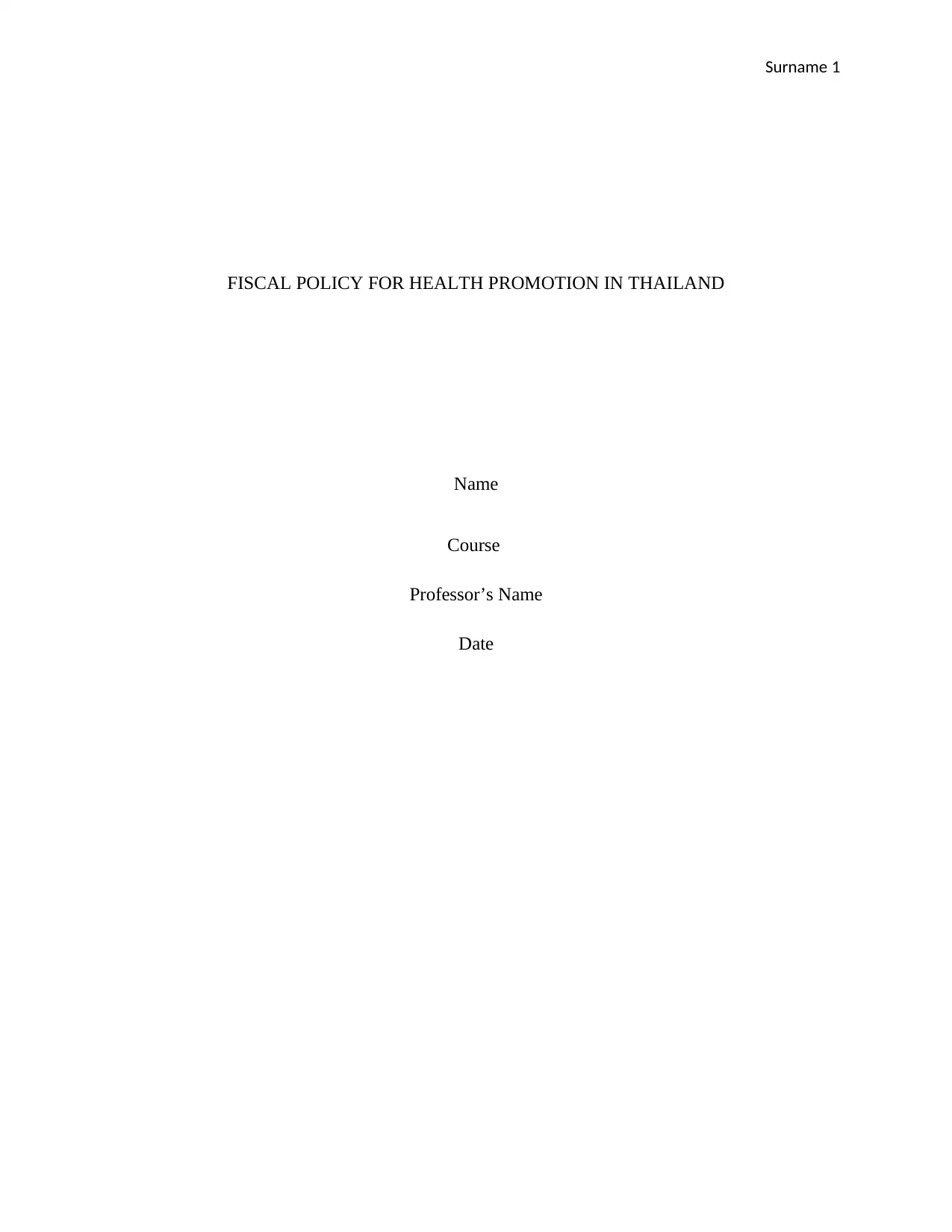
Surname 1
FISCAL POLICY FOR HEALTH PROMOTION IN THAILAND
Name
Course
Professor’s Name
Date
FISCAL POLICY FOR HEALTH PROMOTION IN THAILAND
Name
Course
Professor’s Name
Date
Paraphrase This Document
Need a fresh take? Get an instant paraphrase of this document with our AI Paraphraser
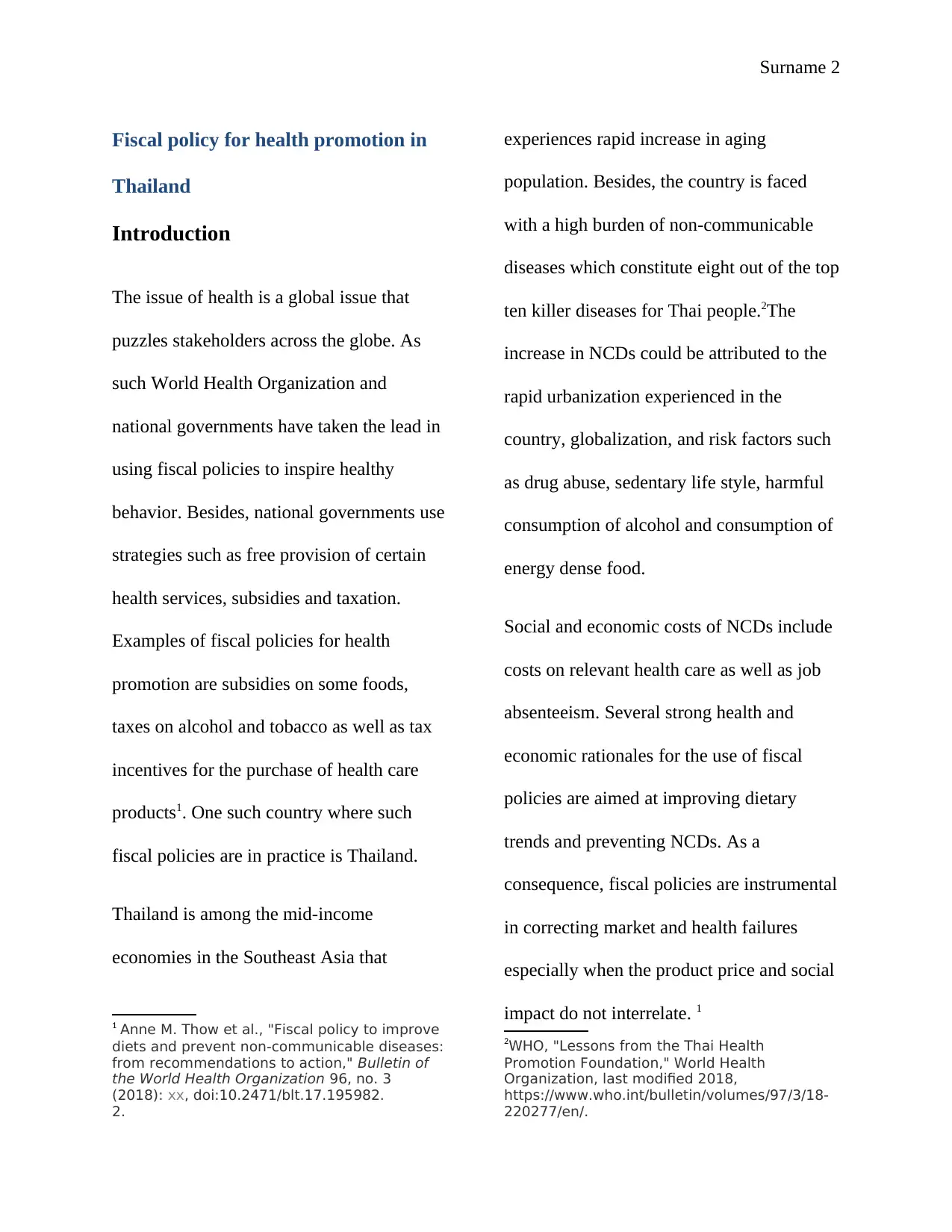
Surname 2
Fiscal policy for health promotion in
Thailand
Introduction
The issue of health is a global issue that
puzzles stakeholders across the globe. As
such World Health Organization and
national governments have taken the lead in
using fiscal policies to inspire healthy
behavior. Besides, national governments use
strategies such as free provision of certain
health services, subsidies and taxation.
Examples of fiscal policies for health
promotion are subsidies on some foods,
taxes on alcohol and tobacco as well as tax
incentives for the purchase of health care
products1. One such country where such
fiscal policies are in practice is Thailand.
Thailand is among the mid-income
economies in the Southeast Asia that
1 Anne M. Thow et al., "Fiscal policy to improve
diets and prevent non-communicable diseases:
from recommendations to action," Bulletin of
the World Health Organization 96, no. 3
(2018): xx, doi:10.2471/blt.17.195982.
2.
experiences rapid increase in aging
population. Besides, the country is faced
with a high burden of non-communicable
diseases which constitute eight out of the top
ten killer diseases for Thai people.2The
increase in NCDs could be attributed to the
rapid urbanization experienced in the
country, globalization, and risk factors such
as drug abuse, sedentary life style, harmful
consumption of alcohol and consumption of
energy dense food.
Social and economic costs of NCDs include
costs on relevant health care as well as job
absenteeism. Several strong health and
economic rationales for the use of fiscal
policies are aimed at improving dietary
trends and preventing NCDs. As a
consequence, fiscal policies are instrumental
in correcting market and health failures
especially when the product price and social
impact do not interrelate. 1
2WHO, "Lessons from the Thai Health
Promotion Foundation," World Health
Organization, last modified 2018,
https://www.who.int/bulletin/volumes/97/3/18-
220277/en/.
Fiscal policy for health promotion in
Thailand
Introduction
The issue of health is a global issue that
puzzles stakeholders across the globe. As
such World Health Organization and
national governments have taken the lead in
using fiscal policies to inspire healthy
behavior. Besides, national governments use
strategies such as free provision of certain
health services, subsidies and taxation.
Examples of fiscal policies for health
promotion are subsidies on some foods,
taxes on alcohol and tobacco as well as tax
incentives for the purchase of health care
products1. One such country where such
fiscal policies are in practice is Thailand.
Thailand is among the mid-income
economies in the Southeast Asia that
1 Anne M. Thow et al., "Fiscal policy to improve
diets and prevent non-communicable diseases:
from recommendations to action," Bulletin of
the World Health Organization 96, no. 3
(2018): xx, doi:10.2471/blt.17.195982.
2.
experiences rapid increase in aging
population. Besides, the country is faced
with a high burden of non-communicable
diseases which constitute eight out of the top
ten killer diseases for Thai people.2The
increase in NCDs could be attributed to the
rapid urbanization experienced in the
country, globalization, and risk factors such
as drug abuse, sedentary life style, harmful
consumption of alcohol and consumption of
energy dense food.
Social and economic costs of NCDs include
costs on relevant health care as well as job
absenteeism. Several strong health and
economic rationales for the use of fiscal
policies are aimed at improving dietary
trends and preventing NCDs. As a
consequence, fiscal policies are instrumental
in correcting market and health failures
especially when the product price and social
impact do not interrelate. 1
2WHO, "Lessons from the Thai Health
Promotion Foundation," World Health
Organization, last modified 2018,
https://www.who.int/bulletin/volumes/97/3/18-
220277/en/.
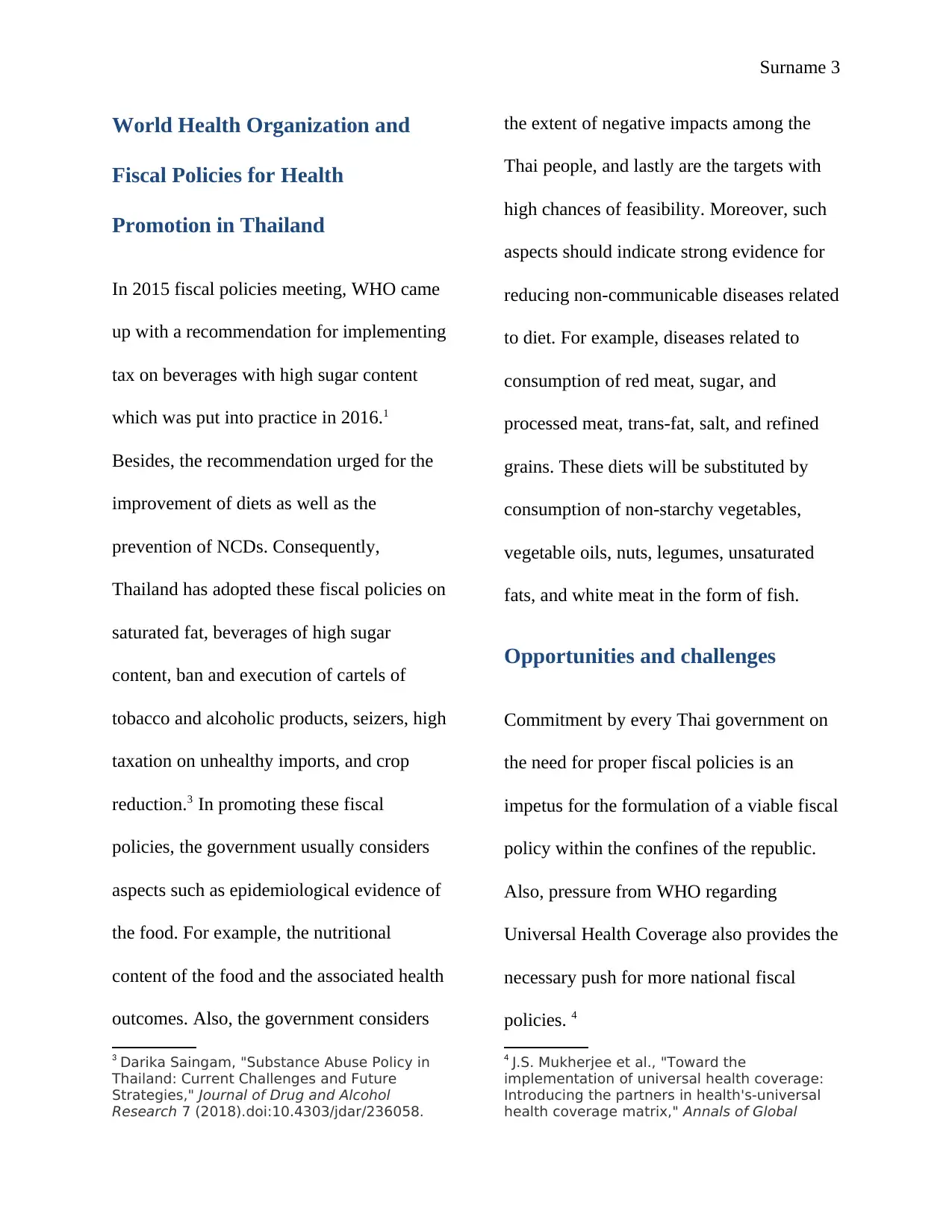
Surname 3
World Health Organization and
Fiscal Policies for Health
Promotion in Thailand
In 2015 fiscal policies meeting, WHO came
up with a recommendation for implementing
tax on beverages with high sugar content
which was put into practice in 2016.1
Besides, the recommendation urged for the
improvement of diets as well as the
prevention of NCDs. Consequently,
Thailand has adopted these fiscal policies on
saturated fat, beverages of high sugar
content, ban and execution of cartels of
tobacco and alcoholic products, seizers, high
taxation on unhealthy imports, and crop
reduction.3 In promoting these fiscal
policies, the government usually considers
aspects such as epidemiological evidence of
the food. For example, the nutritional
content of the food and the associated health
outcomes. Also, the government considers
3 Darika Saingam, "Substance Abuse Policy in
Thailand: Current Challenges and Future
Strategies," Journal of Drug and Alcohol
Research 7 (2018).doi:10.4303/jdar/236058.
the extent of negative impacts among the
Thai people, and lastly are the targets with
high chances of feasibility. Moreover, such
aspects should indicate strong evidence for
reducing non-communicable diseases related
to diet. For example, diseases related to
consumption of red meat, sugar, and
processed meat, trans-fat, salt, and refined
grains. These diets will be substituted by
consumption of non-starchy vegetables,
vegetable oils, nuts, legumes, unsaturated
fats, and white meat in the form of fish.
Opportunities and challenges
Commitment by every Thai government on
the need for proper fiscal policies is an
impetus for the formulation of a viable fiscal
policy within the confines of the republic.
Also, pressure from WHO regarding
Universal Health Coverage also provides the
necessary push for more national fiscal
policies. 4
4 J.S. Mukherjee et al., "Toward the
implementation of universal health coverage:
Introducing the partners in health's-universal
health coverage matrix," Annals of Global
World Health Organization and
Fiscal Policies for Health
Promotion in Thailand
In 2015 fiscal policies meeting, WHO came
up with a recommendation for implementing
tax on beverages with high sugar content
which was put into practice in 2016.1
Besides, the recommendation urged for the
improvement of diets as well as the
prevention of NCDs. Consequently,
Thailand has adopted these fiscal policies on
saturated fat, beverages of high sugar
content, ban and execution of cartels of
tobacco and alcoholic products, seizers, high
taxation on unhealthy imports, and crop
reduction.3 In promoting these fiscal
policies, the government usually considers
aspects such as epidemiological evidence of
the food. For example, the nutritional
content of the food and the associated health
outcomes. Also, the government considers
3 Darika Saingam, "Substance Abuse Policy in
Thailand: Current Challenges and Future
Strategies," Journal of Drug and Alcohol
Research 7 (2018).doi:10.4303/jdar/236058.
the extent of negative impacts among the
Thai people, and lastly are the targets with
high chances of feasibility. Moreover, such
aspects should indicate strong evidence for
reducing non-communicable diseases related
to diet. For example, diseases related to
consumption of red meat, sugar, and
processed meat, trans-fat, salt, and refined
grains. These diets will be substituted by
consumption of non-starchy vegetables,
vegetable oils, nuts, legumes, unsaturated
fats, and white meat in the form of fish.
Opportunities and challenges
Commitment by every Thai government on
the need for proper fiscal policies is an
impetus for the formulation of a viable fiscal
policy within the confines of the republic.
Also, pressure from WHO regarding
Universal Health Coverage also provides the
necessary push for more national fiscal
policies. 4
4 J.S. Mukherjee et al., "Toward the
implementation of universal health coverage:
Introducing the partners in health's-universal
health coverage matrix," Annals of Global
⊘ This is a preview!⊘
Do you want full access?
Subscribe today to unlock all pages.

Trusted by 1+ million students worldwide
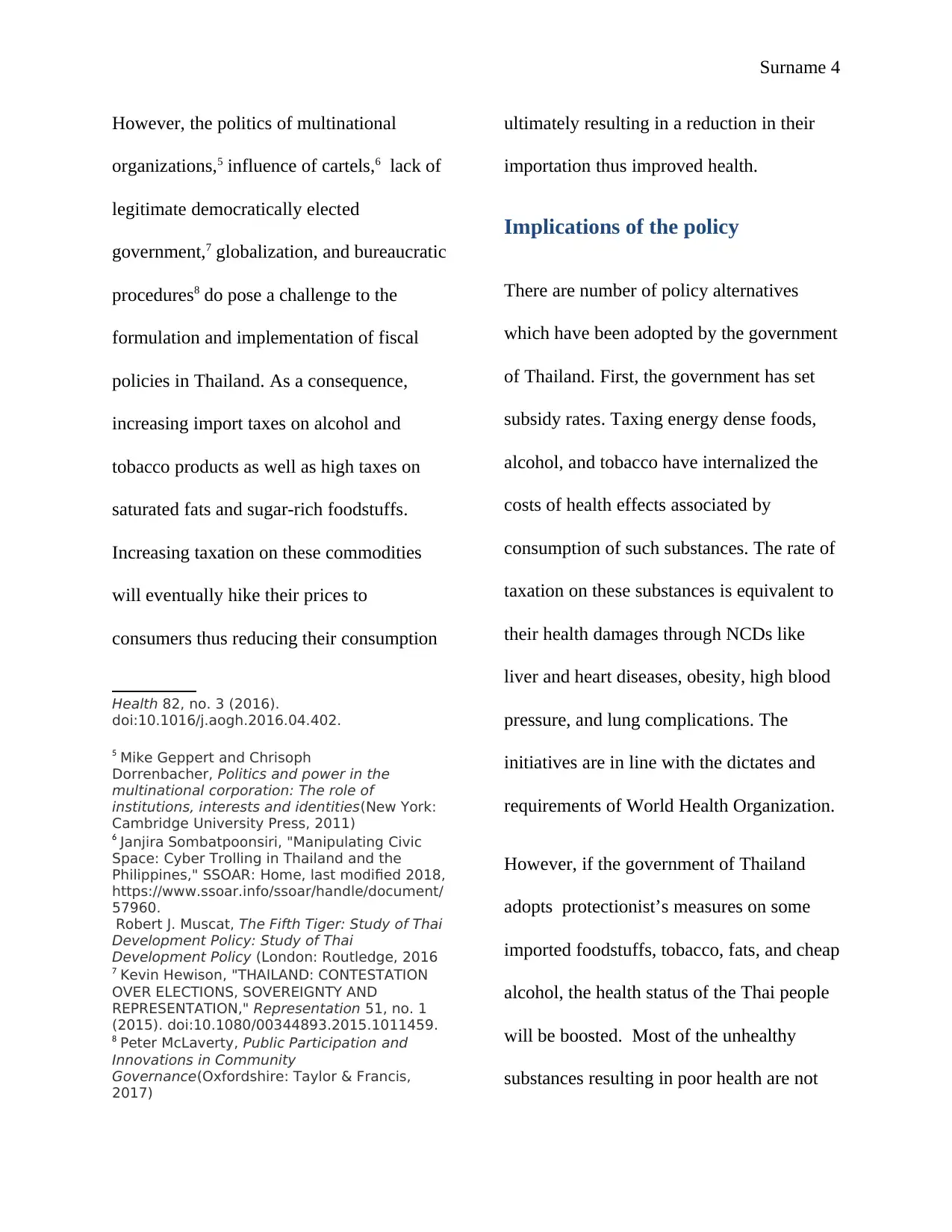
Surname 4
However, the politics of multinational
organizations,5 influence of cartels,6 lack of
legitimate democratically elected
government,7 globalization, and bureaucratic
procedures8 do pose a challenge to the
formulation and implementation of fiscal
policies in Thailand. As a consequence,
increasing import taxes on alcohol and
tobacco products as well as high taxes on
saturated fats and sugar-rich foodstuffs.
Increasing taxation on these commodities
will eventually hike their prices to
consumers thus reducing their consumption
Health 82, no. 3 (2016).
doi:10.1016/j.aogh.2016.04.402.
5 Mike Geppert and Chrisoph
Dorrenbacher, Politics and power in the
multinational corporation: The role of
institutions, interests and identities(New York:
Cambridge University Press, 2011)
6 Janjira Sombatpoonsiri, "Manipulating Civic
Space: Cyber Trolling in Thailand and the
Philippines," SSOAR: Home, last modified 2018,
https://www.ssoar.info/ssoar/handle/document/
57960.
Robert J. Muscat, The Fifth Tiger: Study of Thai
Development Policy: Study of Thai
Development Policy (London: Routledge, 2016
7 Kevin Hewison, "THAILAND: CONTESTATION
OVER ELECTIONS, SOVEREIGNTY AND
REPRESENTATION," Representation 51, no. 1
(2015). doi:10.1080/00344893.2015.1011459.
8 Peter McLaverty, Public Participation and
Innovations in Community
Governance(Oxfordshire: Taylor & Francis,
2017)
ultimately resulting in a reduction in their
importation thus improved health.
Implications of the policy
There are number of policy alternatives
which have been adopted by the government
of Thailand. First, the government has set
subsidy rates. Taxing energy dense foods,
alcohol, and tobacco have internalized the
costs of health effects associated by
consumption of such substances. The rate of
taxation on these substances is equivalent to
their health damages through NCDs like
liver and heart diseases, obesity, high blood
pressure, and lung complications. The
initiatives are in line with the dictates and
requirements of World Health Organization.
However, if the government of Thailand
adopts protectionist’s measures on some
imported foodstuffs, tobacco, fats, and cheap
alcohol, the health status of the Thai people
will be boosted. Most of the unhealthy
substances resulting in poor health are not
However, the politics of multinational
organizations,5 influence of cartels,6 lack of
legitimate democratically elected
government,7 globalization, and bureaucratic
procedures8 do pose a challenge to the
formulation and implementation of fiscal
policies in Thailand. As a consequence,
increasing import taxes on alcohol and
tobacco products as well as high taxes on
saturated fats and sugar-rich foodstuffs.
Increasing taxation on these commodities
will eventually hike their prices to
consumers thus reducing their consumption
Health 82, no. 3 (2016).
doi:10.1016/j.aogh.2016.04.402.
5 Mike Geppert and Chrisoph
Dorrenbacher, Politics and power in the
multinational corporation: The role of
institutions, interests and identities(New York:
Cambridge University Press, 2011)
6 Janjira Sombatpoonsiri, "Manipulating Civic
Space: Cyber Trolling in Thailand and the
Philippines," SSOAR: Home, last modified 2018,
https://www.ssoar.info/ssoar/handle/document/
57960.
Robert J. Muscat, The Fifth Tiger: Study of Thai
Development Policy: Study of Thai
Development Policy (London: Routledge, 2016
7 Kevin Hewison, "THAILAND: CONTESTATION
OVER ELECTIONS, SOVEREIGNTY AND
REPRESENTATION," Representation 51, no. 1
(2015). doi:10.1080/00344893.2015.1011459.
8 Peter McLaverty, Public Participation and
Innovations in Community
Governance(Oxfordshire: Taylor & Francis,
2017)
ultimately resulting in a reduction in their
importation thus improved health.
Implications of the policy
There are number of policy alternatives
which have been adopted by the government
of Thailand. First, the government has set
subsidy rates. Taxing energy dense foods,
alcohol, and tobacco have internalized the
costs of health effects associated by
consumption of such substances. The rate of
taxation on these substances is equivalent to
their health damages through NCDs like
liver and heart diseases, obesity, high blood
pressure, and lung complications. The
initiatives are in line with the dictates and
requirements of World Health Organization.
However, if the government of Thailand
adopts protectionist’s measures on some
imported foodstuffs, tobacco, fats, and cheap
alcohol, the health status of the Thai people
will be boosted. Most of the unhealthy
substances resulting in poor health are not
Paraphrase This Document
Need a fresh take? Get an instant paraphrase of this document with our AI Paraphraser
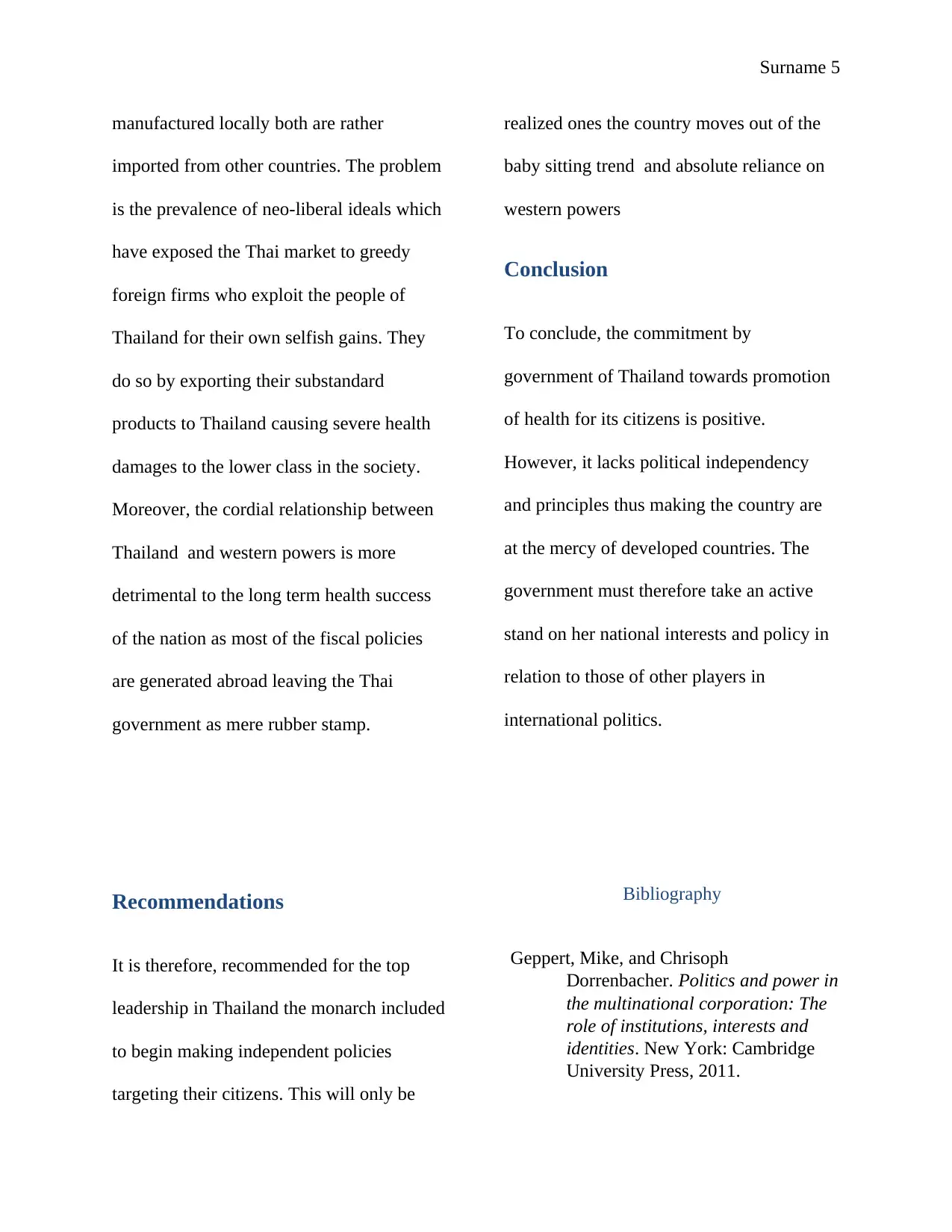
Surname 5
manufactured locally both are rather
imported from other countries. The problem
is the prevalence of neo-liberal ideals which
have exposed the Thai market to greedy
foreign firms who exploit the people of
Thailand for their own selfish gains. They
do so by exporting their substandard
products to Thailand causing severe health
damages to the lower class in the society.
Moreover, the cordial relationship between
Thailand and western powers is more
detrimental to the long term health success
of the nation as most of the fiscal policies
are generated abroad leaving the Thai
government as mere rubber stamp.
Recommendations
It is therefore, recommended for the top
leadership in Thailand the monarch included
to begin making independent policies
targeting their citizens. This will only be
realized ones the country moves out of the
baby sitting trend and absolute reliance on
western powers
Conclusion
To conclude, the commitment by
government of Thailand towards promotion
of health for its citizens is positive.
However, it lacks political independency
and principles thus making the country are
at the mercy of developed countries. The
government must therefore take an active
stand on her national interests and policy in
relation to those of other players in
international politics.
Bibliography
Geppert, Mike, and Chrisoph
Dorrenbacher. Politics and power in
the multinational corporation: The
role of institutions, interests and
identities. New York: Cambridge
University Press, 2011.
manufactured locally both are rather
imported from other countries. The problem
is the prevalence of neo-liberal ideals which
have exposed the Thai market to greedy
foreign firms who exploit the people of
Thailand for their own selfish gains. They
do so by exporting their substandard
products to Thailand causing severe health
damages to the lower class in the society.
Moreover, the cordial relationship between
Thailand and western powers is more
detrimental to the long term health success
of the nation as most of the fiscal policies
are generated abroad leaving the Thai
government as mere rubber stamp.
Recommendations
It is therefore, recommended for the top
leadership in Thailand the monarch included
to begin making independent policies
targeting their citizens. This will only be
realized ones the country moves out of the
baby sitting trend and absolute reliance on
western powers
Conclusion
To conclude, the commitment by
government of Thailand towards promotion
of health for its citizens is positive.
However, it lacks political independency
and principles thus making the country are
at the mercy of developed countries. The
government must therefore take an active
stand on her national interests and policy in
relation to those of other players in
international politics.
Bibliography
Geppert, Mike, and Chrisoph
Dorrenbacher. Politics and power in
the multinational corporation: The
role of institutions, interests and
identities. New York: Cambridge
University Press, 2011.
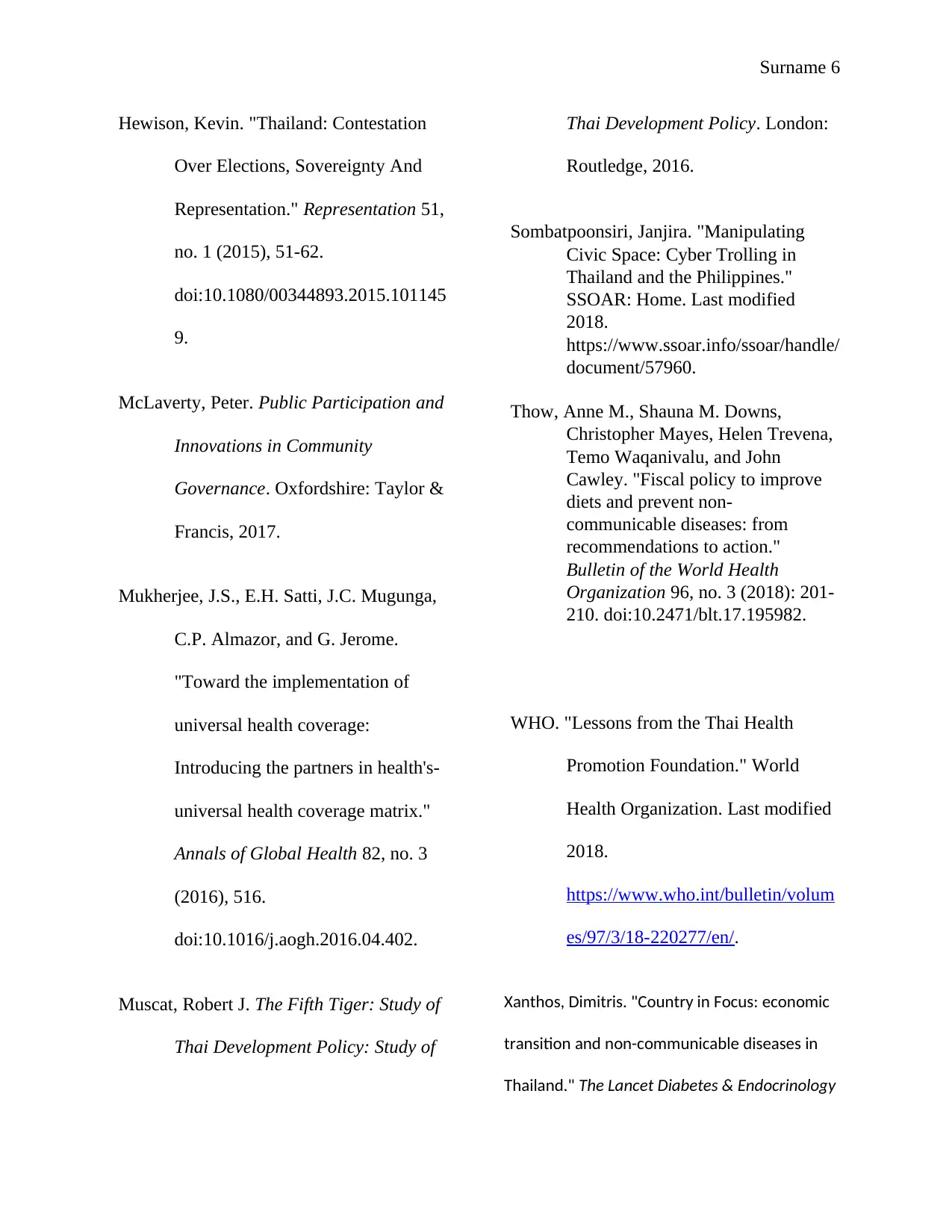
Surname 6
Hewison, Kevin. "Thailand: Contestation
Over Elections, Sovereignty And
Representation." Representation 51,
no. 1 (2015), 51-62.
doi:10.1080/00344893.2015.101145
9.
McLaverty, Peter. Public Participation and
Innovations in Community
Governance. Oxfordshire: Taylor &
Francis, 2017.
Mukherjee, J.S., E.H. Satti, J.C. Mugunga,
C.P. Almazor, and G. Jerome.
"Toward the implementation of
universal health coverage:
Introducing the partners in health's-
universal health coverage matrix."
Annals of Global Health 82, no. 3
(2016), 516.
doi:10.1016/j.aogh.2016.04.402.
Muscat, Robert J. The Fifth Tiger: Study of
Thai Development Policy: Study of
Thai Development Policy. London:
Routledge, 2016.
Sombatpoonsiri, Janjira. "Manipulating
Civic Space: Cyber Trolling in
Thailand and the Philippines."
SSOAR: Home. Last modified
2018.
https://www.ssoar.info/ssoar/handle/
document/57960.
Thow, Anne M., Shauna M. Downs,
Christopher Mayes, Helen Trevena,
Temo Waqanivalu, and John
Cawley. "Fiscal policy to improve
diets and prevent non-
communicable diseases: from
recommendations to action."
Bulletin of the World Health
Organization 96, no. 3 (2018): 201-
210. doi:10.2471/blt.17.195982.
WHO. "Lessons from the Thai Health
Promotion Foundation." World
Health Organization. Last modified
2018.
https://www.who.int/bulletin/volum
es/97/3/18-220277/en/.
Xanthos, Dimitris. "Country in Focus: economic
transition and non-communicable diseases in
Thailand." The Lancet Diabetes & Endocrinology
Hewison, Kevin. "Thailand: Contestation
Over Elections, Sovereignty And
Representation." Representation 51,
no. 1 (2015), 51-62.
doi:10.1080/00344893.2015.101145
9.
McLaverty, Peter. Public Participation and
Innovations in Community
Governance. Oxfordshire: Taylor &
Francis, 2017.
Mukherjee, J.S., E.H. Satti, J.C. Mugunga,
C.P. Almazor, and G. Jerome.
"Toward the implementation of
universal health coverage:
Introducing the partners in health's-
universal health coverage matrix."
Annals of Global Health 82, no. 3
(2016), 516.
doi:10.1016/j.aogh.2016.04.402.
Muscat, Robert J. The Fifth Tiger: Study of
Thai Development Policy: Study of
Thai Development Policy. London:
Routledge, 2016.
Sombatpoonsiri, Janjira. "Manipulating
Civic Space: Cyber Trolling in
Thailand and the Philippines."
SSOAR: Home. Last modified
2018.
https://www.ssoar.info/ssoar/handle/
document/57960.
Thow, Anne M., Shauna M. Downs,
Christopher Mayes, Helen Trevena,
Temo Waqanivalu, and John
Cawley. "Fiscal policy to improve
diets and prevent non-
communicable diseases: from
recommendations to action."
Bulletin of the World Health
Organization 96, no. 3 (2018): 201-
210. doi:10.2471/blt.17.195982.
WHO. "Lessons from the Thai Health
Promotion Foundation." World
Health Organization. Last modified
2018.
https://www.who.int/bulletin/volum
es/97/3/18-220277/en/.
Xanthos, Dimitris. "Country in Focus: economic
transition and non-communicable diseases in
Thailand." The Lancet Diabetes & Endocrinology
⊘ This is a preview!⊘
Do you want full access?
Subscribe today to unlock all pages.

Trusted by 1+ million students worldwide
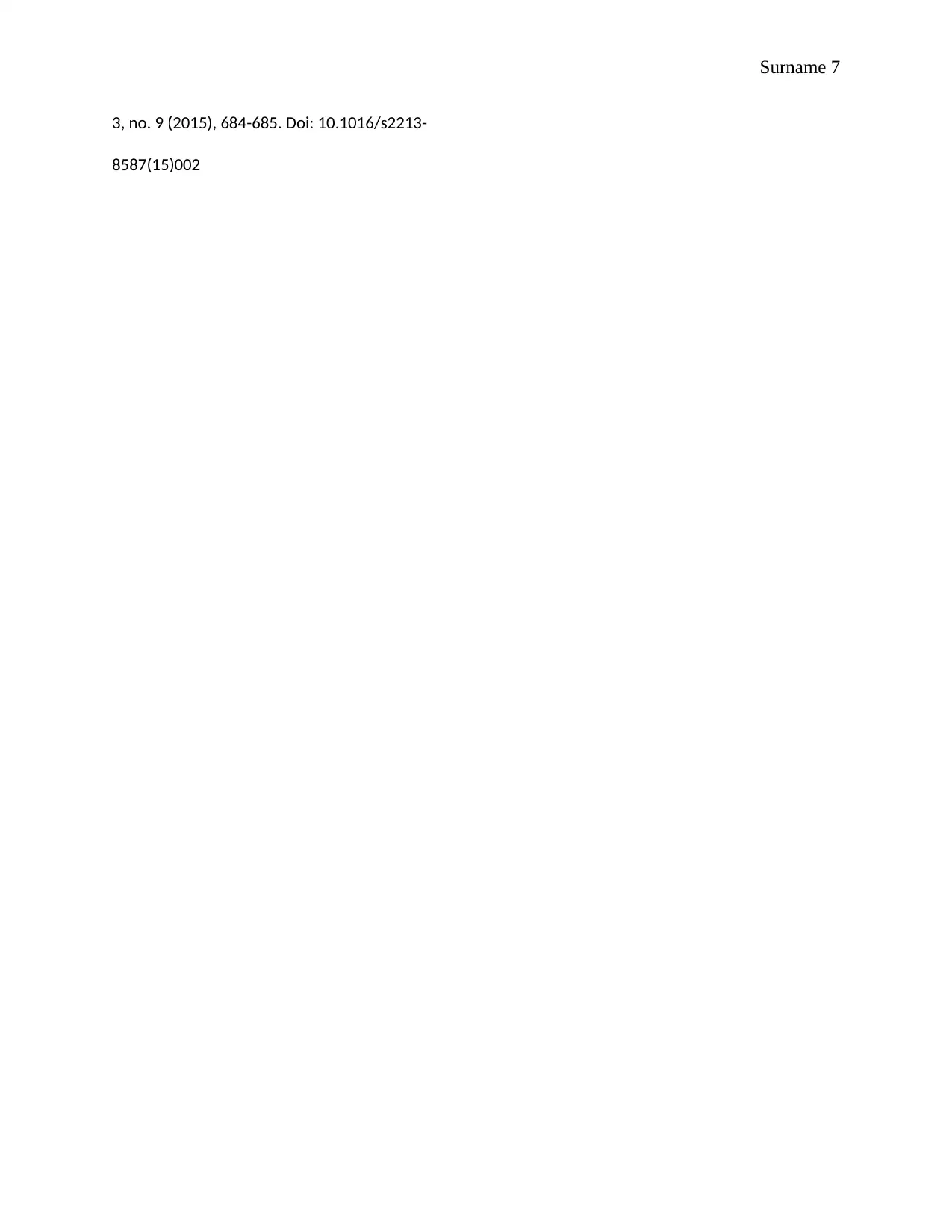
Surname 7
3, no. 9 (2015), 684-685. Doi: 10.1016/s2213-
8587(15)002
3, no. 9 (2015), 684-685. Doi: 10.1016/s2213-
8587(15)002
1 out of 7
Related Documents
Your All-in-One AI-Powered Toolkit for Academic Success.
+13062052269
info@desklib.com
Available 24*7 on WhatsApp / Email
![[object Object]](/_next/static/media/star-bottom.7253800d.svg)
Unlock your academic potential
Copyright © 2020–2026 A2Z Services. All Rights Reserved. Developed and managed by ZUCOL.





